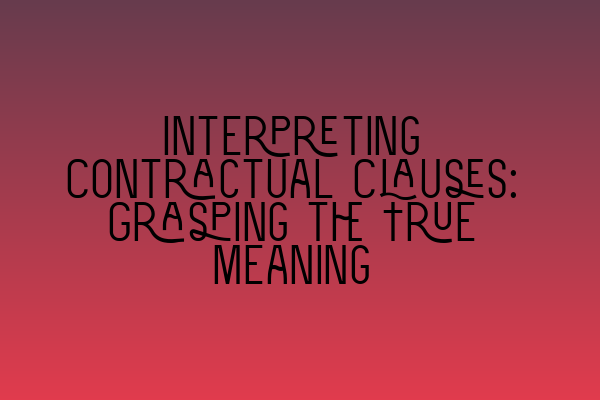Interpreting Contractual Clauses: Grasping the True Meaning
When it comes to contract law, one of the most crucial skills a solicitor can have is the ability to interpret contractual clauses accurately. Contractual clauses lay out the rights, obligations, and responsibilities of the parties involved, and understanding their true meaning is essential to ensure the enforceability and effectiveness of the contract.
In this blog post, we will explore the art of interpreting contractual clauses and provide you with valuable insights to help you grasp their true meaning. Whether you are a seasoned solicitor or a law student preparing for the SQE exams, the knowledge and techniques shared in this article will be invaluable to your practice.
1. Read the Contract as a Whole
Before diving into the individual clauses, it is crucial to read the contract as a whole. Understanding the context can provide valuable clues to interpret the clauses accurately. Pay attention to the recitals, definitions, and general provisions that set the stage for the specific clauses.
For an in-depth understanding of contract law concepts, consider taking SQE 1 Preparation Courses. These courses provide comprehensive coverage of contract law principles and will equip you with the necessary knowledge to interpret contractual clauses effectively.
2. Analyze the Language Used
Language is a powerful tool in contract drafting. The choice of words, punctuation, and sentence structure can significantly impact the interpretation of a contractual clause. Pay close attention to the language used and consider its ordinary and natural meaning.
Sometimes, the parties may include specific definitions within the contract. Make sure to refer to these definitions when interpreting the clauses. If you are unsure about the meaning of a term, consider consulting legal dictionaries or seeking advice from experienced solicitors.
3. Consider the Intention of the Parties
When interpreting a contractual clause, it is crucial to consider the intention of the parties involved. What was the purpose of including that specific clause in the contract? What were the parties trying to achieve?
Look for any indications of intention within the contract itself, such as the preamble or the background information provided. Also, consider any external evidence, such as previous negotiations or correspondence between the parties, which may shed light on their intentions.
4. Apply the Principle of Contra Proferentem
When there is ambiguity or uncertainty in the interpretation of a contractual clause, the principle of contra proferentem comes into play. This principle states that any ambiguity should be interpreted against the party who drafted the contract.
The rationale behind this principle is that the party who drafted the contract had the opportunity to make the meaning of the clause clear and unambiguous. Therefore, any doubts or ambiguities should be resolved in favor of the other party.
5. Seek Guidance from Case Law
Case law plays a significant role in interpreting contractual clauses. Previous court decisions can provide valuable insights into how certain clauses have been interpreted in different contexts. By examining relevant case law, you can understand how courts have approached similar contractual provisions and apply those principles to your own interpretation.
SQE 1 Practice Exam Questions and SQE 1 Practice Mocks FLK1 FLK2 are excellent resources to test your understanding of contract law concepts and familiarize yourself with the application of these concepts in exam-like scenarios. These practice materials can provide you with real-world examples of contractual clauses and their interpretation, helping you refine your skills.
In summary, interpreting contractual clauses requires a combination of careful reading, analysis of language, consideration of parties’ intentions, application of legal principles, and utilization of case law. By honing your skills in interpreting contractual clauses, you can secure the best outcomes for your clients and establish yourself as a competent and trusted solicitor.
For further preparation for the SQE exams, including SQE 2 Preparation Courses and comprehensive SQE 1 Preparation Courses, visit our website. Stay updated on the latest SRA SQE Exam Dates to plan your study schedule effectively.
Remember, mastering the art of interpreting contractual clauses takes time and practice. Continuously refine your skills, stay curious, and stay informed about the latest developments in contract law. Your dedication and expertise will undoubtedly set you apart and pave the way to a successful legal career.
